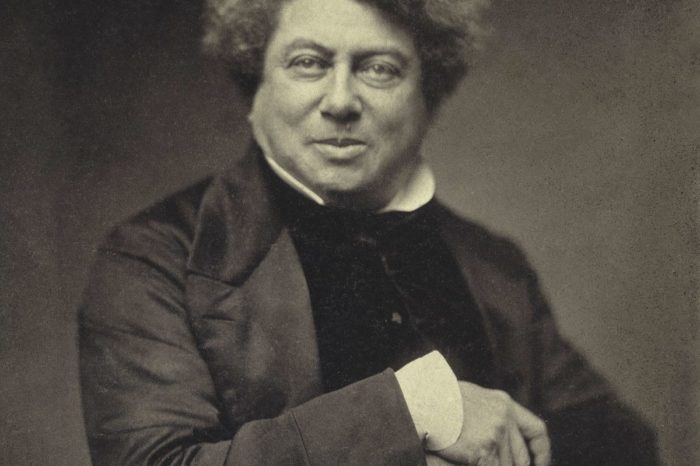Reading great literature like ‘The Count of Monte Cristo’ helps students become great readers
This op-ed appeared in The Daily Caller, The Berkshire Eagle, CommonWealth magazine, and The Lowell Sun.
“Live, then, and be happy, beloved children of my heart, and never forget,” reads “The Count of Monte Cristo” by French novelist Alexandre Dumas, “that all human wisdom is contained in these two words — `Wait and hope.'”
Tuesday marks the birthday of Monsieur Dumas, genius of 19th-century romantic historical fiction, whose other masterworks include “The Three Musketeers” (1844) and “The Man in the Iron Mask” (1847-50). A versatile writer, he also adapted E.T.A. Hoffmann’s scary story into a sweeter tale that became the basis for Peter Tchaikovsky’s immortal ballet, “The Nutcracker.”
Dumas’s nearly 300 published volumes have been translated into 100 languages, ranking him as the world’s 13th most-translated author and even surpassing several titans — including Twain, Tolstoy, and Dickens.
Since 2005, Massachusetts, with K-12 English standards that were rich in classical literature, has outperformed every other state on the reading portion of the National Assessment of Educational Progress (NAEP), “the nation’s report card.” Reading books like “The Count of Monte Cristo” helped students achieve this distinction.
The author’s father, Thomas-Alexandre (Alex) Dumas, son of a scoundrel French marquis and a black slave woman, is the subject of Tom Reiss’s 2013 Pulitzer Prize-winning biography, “The Black Count.” Alex’s life was something beyond improbable: ascending from slavery in the Caribbean sugar colony of Saint-Domingue (now Haiti) to command 50,000 men in the French Revolutionary and Napoleonic armies. General Dumas was the heroic inspiration for his son’s adventure novels.
Alexandre Dumas’s intriguing plots elevate our understanding of history, geography and culture. Few authors can use swashbuckling action to ignite students’ imaginations, while simultaneously teaching about the glory and treachery within human nature.
Sadly, in 2010 the Bay State abandoned its literature-rich English standards for inferior national ones, the Common Core, which slashed fiction by 60 percent and stagnated NAEP reading scores. Marginalizing great books deprives schoolchildren of legendary stories that can transform young lives.
“The Count of Monte Cristo” is Dumas’s most thought-provoking novel. This revenge thriller features an innocent, uneducated French sailor, Edmond Dant s. His naivete allows him to be manipulated by scheming Machiavels, who unjustly imprison him for 14 years in the notorious dungeon fortress, Ch teau d’If.
While incarcerated, Edmund is befriended by a wise, aging inmate, Abb Faria, who teaches him to understand timeless writings, dissect conspiracies, and become a skillful swordsman. Abb also reveals to Edmund the whereabouts of a buried treasure. Once Edmund escapes, wealth and knowledge transform his identity into the calculating Count of Monte Cristo, who shrewdly exacts his revenge on the malicious villains.
Dumas’s enduring lessons also apply to K-12 education policy: Wily and self-serving adults would sooner consign unschooled young people to futures of intellectual solitary confinement than teach them the classic texts and ideas that might ensure their survival in the world.
“How is it that little children are so intelligent and men so stupid?” Dumas asked prophetically. “It must be education that does it.”
Decades of research report that “boredom,” which another writer called “the shriek of unused capacity,” is the major reason one million students annually drop out of high school. Eighty percent of America’s minority-majority prison population are dropouts. Education bereft of great stories like Dumas’s will only exacerbate this crisis.
“No popularity in this century has exceeded that of Alexandre Dumas; his successes are better than successes; they are triumphs ” fellow French novelist Victor Hugo wrote. “The name of Alexandre Dumas is more than French; it is more than European, it is universal.”
In 2002, the French government sought to remedy past racism by disinterring Dumas’s body and entombing its widely read author in Paris’s Panth on. Unfortunately, his enchanting tales will remain locked away from American students, as his books are not included in the Common Core.
“To remember a person is the most important thing in the novels of Alexandre Dumas,” Tom Reiss writes. “The worst sin anyone can commit is to forget.” If our sister republic can finally exalt the action-packed life and works of Alexandre Dumas, then let’s “wait and hope” that American high schools can too.
Jamie Gass is director of the Center for School Reform at Pioneer Institute, a Boston-based think tank.



